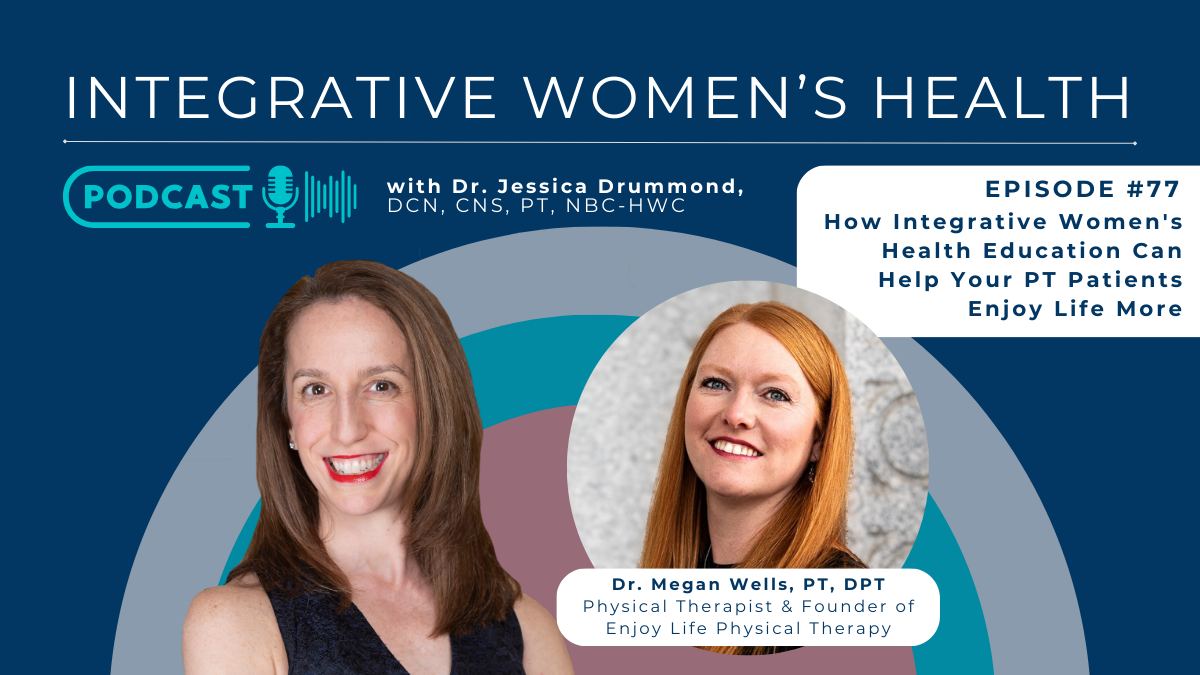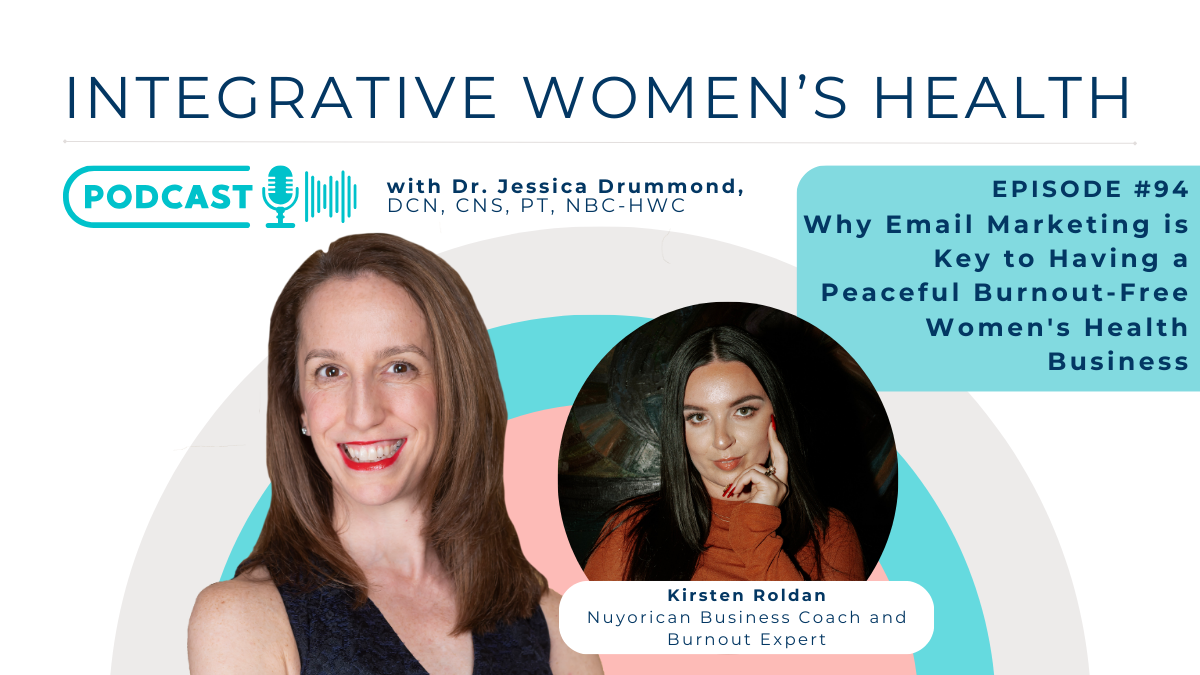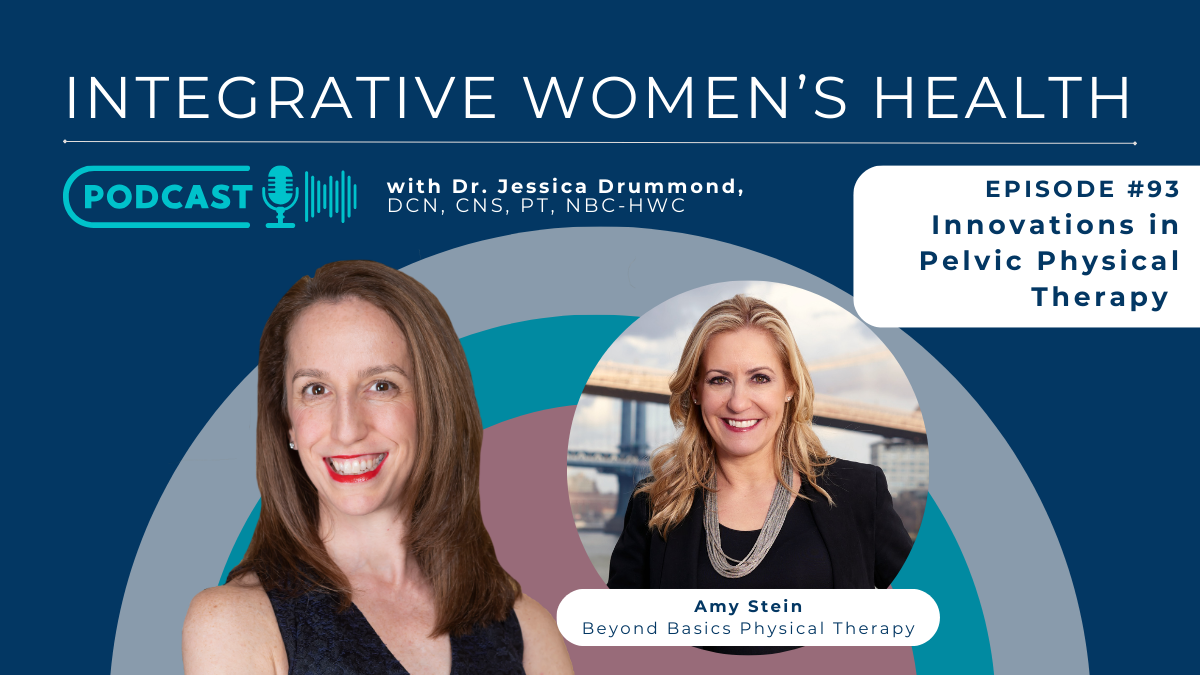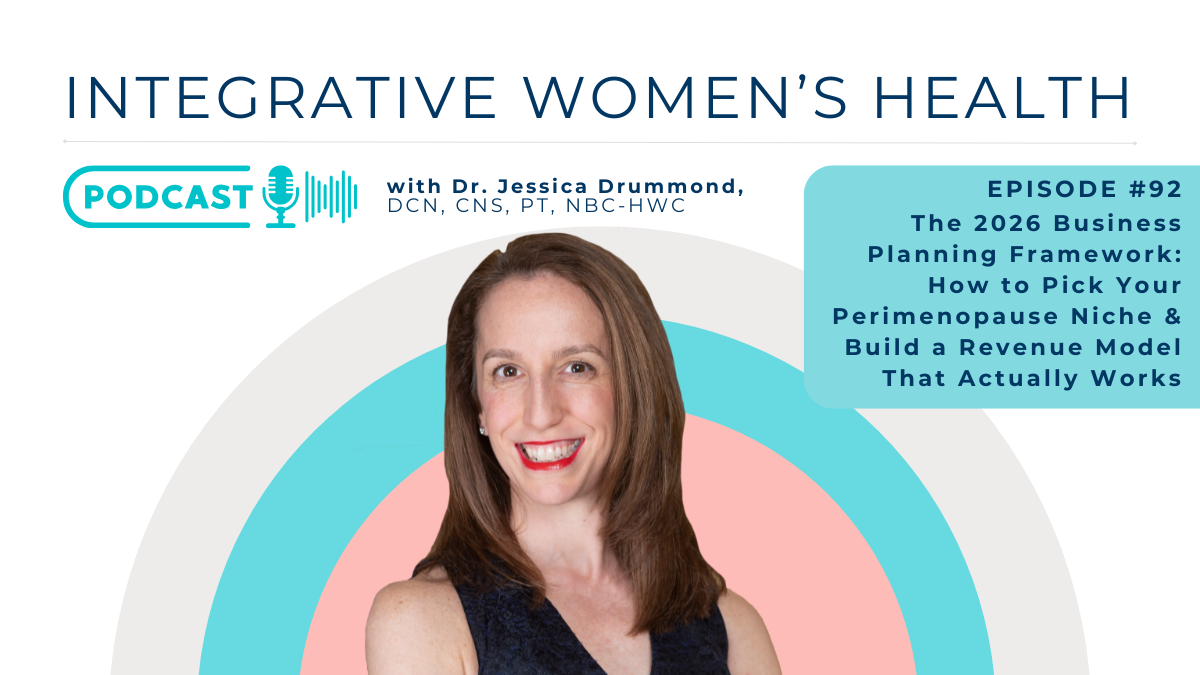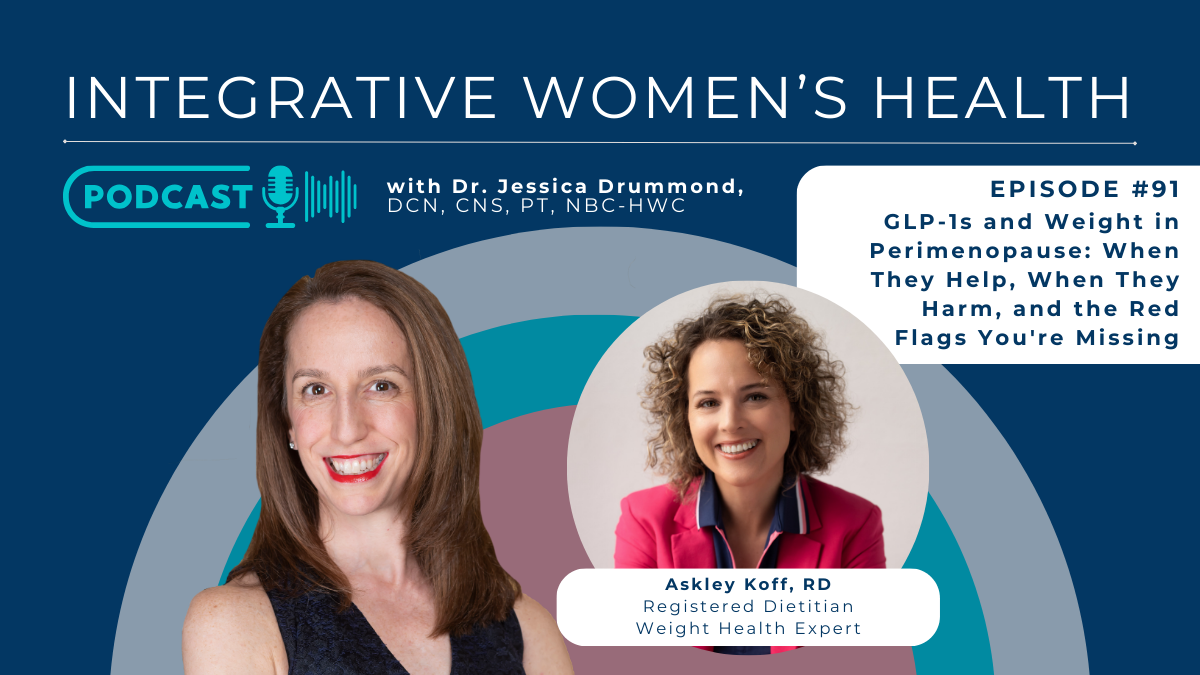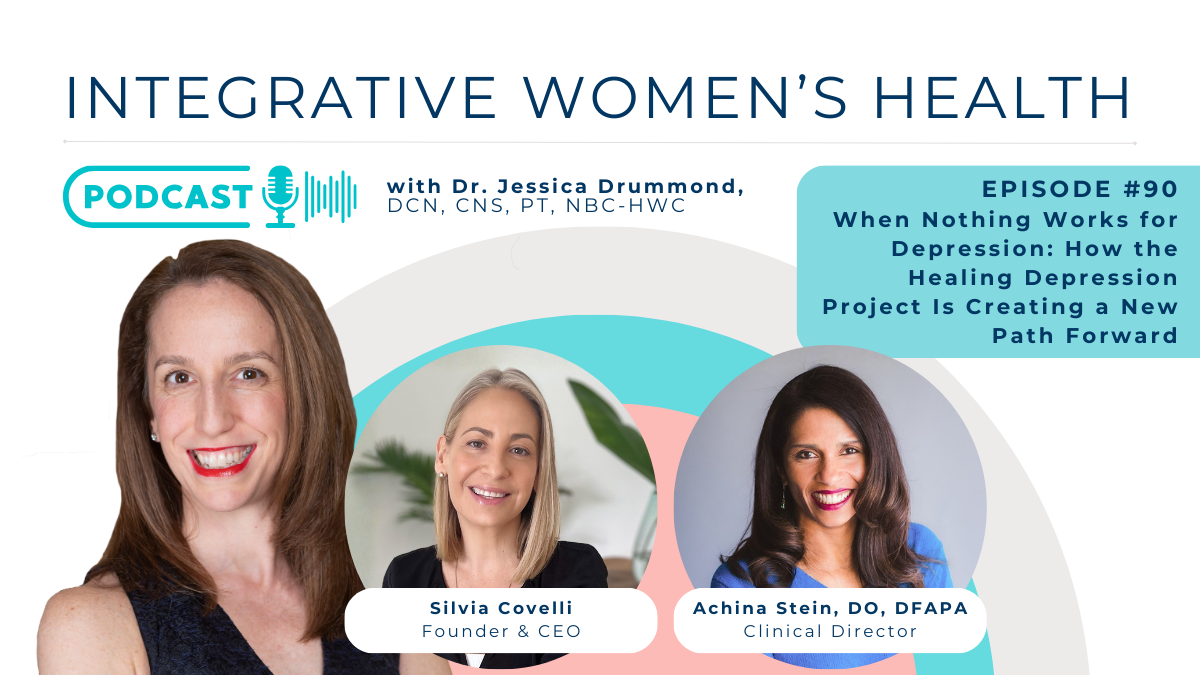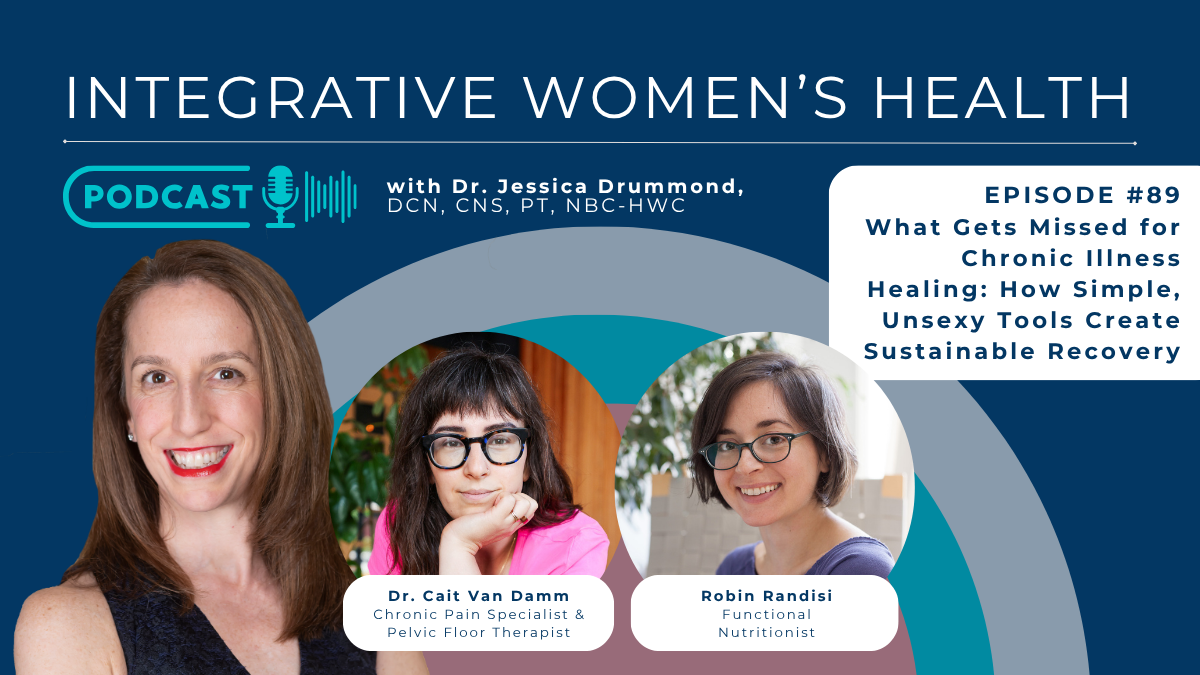Follow Us for Free:
About the episode
“I can’t just treat a knee or a shoulder; if I really want to make progress with people and they’re not sleeping well or they’re not eating well, I’m not getting anywhere with them.” – Megan Wells
True healing requires a full-body, holistic approach. Especially in this continuing COVID world, many of our clients come to us struggling with conditions like chronic pain, fatigue, dysautonomia, or autoimmune issues, often all at once. Managing that successfully means nervous system regulation, nutrition, sleep, social support, and helping them define what enjoying life really looks like.
This shift in perspective has the potential to transform the field for physical therapists and other practitioners who are already spending more time with their patients and clients. By stepping beyond the narrow scope of rehab, we can become cornerstones of our clients’ health teams. Using the time we have with them week by week, we can help our clients not only improve their knee pain but also their entire quality of life.
Today I’m joined by Dr. Megan Wells to talk about expanding the practice of physical therapy and working with people with complex chronic illness. Megan is the founder of Enjoy Life Physical Therapy and a graduate of the Integrative Women’s Health Institute who has expanded her practice in a way that empowers her clients through a root-cause model that considers nervous system regulation at its core.
In this episode, Megan and I discuss how physical therapy is evolving to address complex chronic illnesses in women, why we need an integrative, holistic approach, Megan’s journey from traditional physical therapy, the importance of patient-centered care, how we can empower clients to make sustainable changes, and more.
Enjoy the episode, and let’s innovate and integrate together!
About Dr. Megan Wells, PT, DPT
Dr. Megan Wells is a Doctor of Physical Therapy, graduated from the University of Utah in 2008, and a certified 500-hour yoga instructor. She is the founder of Enjoy Life Physical Therapy, where she specializes in helping individuals with chronic conditions, disabilities, or limited abilities optimize their health. Through a blend of functional and lifestyle medicine, Dr. Wells collaborates with her clients to create personalized wellness plans that support longevity to enjoy life in all it’s stages.
When she’s not working with clients, you’ll find Dr. Wells enjoying life in the mountains she calls home with her husband and four kids—hiking, waterskiing, cross-country skiing, or unwinding with a restorative yoga practice.
Highlights
- Megan’s journey into physical therapy and her motivation to adopt a holistic approach
- How functional nutrition can help clients with complex, overlapping chronic conditions
- Success stories of clients with chronic illness in perimenopause or menopause
- How Megan’s personal experience using integrative tools informs her client care
- The impact of practical interventions like sleep and nervous system regulation
- Barriers clients face when trying to implement new routines and practices
- How coaching helps clients make sustainable lifestyle changes
- The importance of having a reliable support system
- The evolution of client goals along the healing journey
- Why physical therapists should pursue integrative and functional approaches
- The impact of providing comprehensive, ongoing support for clients with complex needs
- Why physical and occupational therapists often make excellent health coaches
- The value of collaborative care and empowering clients to lead their own path
- The need for support with basic self-care for those living with chronic illness
- How physical therapy is evolving to include trauma, mental health, and lifestyle medicine
Connect with Dr. Megan Wells
- Dr. Megan Wells Practice | Enjoy Life Physical Therapy
- Dr. Megan Wells on Instagram @enjoylifephysicaltherapy
- Dr. Megan Wells on Facebook
Mentioned in this episode
Ready to revolutionize your career and grow your practice?
- The Integrative Women’s Health Membership
- What is the next step in your career in women’s health and wellness? Start here: https://integrativewomenshealthinstitute.com/start-here/
- Integrative Women’s Health Institute on Instagram | @integrativewomenshealth
- Integrative Women’s Health Institute on YouTube
Learn more about The Integrative Women’s Health Institute’s Programs.
Click here for a full transcript of the episode.
Dr. Jessica Drummond 00:00:03 Hi and welcome to the Integrative Women’s Health Podcast. I’m your host, Doctor Jessica Drummond, and I am so thrilled to have you here. As we dive into today’s episode, as always innovating and integrating in the world of women’s health. And just as a reminder, the content in this podcast episode is no substitute for medical advice, diagnosis, or treatment from your medical or licensed health care team. While myself and many of my guests are licensed healthcare professionals, we are not your licensed healthcare professionals, so you want to get advice on your unique circumstances. Diagnostic recommendations treatment recommendations from your home medical team. Enjoy the episode. Let’s innovate and integrate together. Today we’re going to talk about the expansion.
Dr. Jessica Drummond 00:01:06 Of the practice of physical therapy. For if you are a physical therapist who wants to start reaching into your community and working with people with complex chronic illness, any chronic illness, you’re going to meet. Megan. Well, she is the founder of Enjoy Life Physical Therapist. I love the name of that company.
Dr. Jessica Drummond 00:01:27 She helps people with chronic illnesses of really all ages. She’s really leaning into perimenopause and menopause now, but she started working in her community with adults and older adults with chronic issues such as arthritis, chronic pain, chronic fatigue issues. Potts Marcus. And you’re going to see that as she stepped into our programs here at the Integrative Women’s Health Institute, she began to expand and more deeply understand how she could be a physical therapist. That really empowers her client through this lifestyle medicine model. Root cause model through model that really considers nervous system regulation at its core. And if you know anything about the Integrative Women’s Health Institute, you know that our step one of everything is talking about nervous system regulation and meeting your clients where they are. What is her vision? Has anyone ever asked her what she wants, where she wants to start, what support she has from her family and her community? And Megan is really stepping into being one of those support team members, a real cornerstone of her client’s health team to help them navigate the system, navigate and reach their own goals.
Dr. Jessica Drummond 00:02:49 And surprisingly, we chatted a little after this episode. She’s actually been working with more and more teenagers because the reality is chronic illness knows no age. you know. She has more teenagers with chronic concussion or post-concussion syndrome, arthritic and chronic pain conditions, autoimmune diseases. And we teach so much about how the integrative model can help get to the root cause of those issues. So Megan is a doctor of physical therapy. She graduated from the University of Utah in 2008. She’s also a certified yoga instructor. She’s just such a calming presence that I can really see how she’s made a huge impact on her community in Utah by taking this broader approach. And not only has she changed how she practices physical therapy, but we’re really seeing physical therapy expand to what it can be and stay till the end of this conversation, because we talk about a little nugget of powerful legislation in Utah, and I can’t wait to see this happening nationwide? I know it’s starting to happen nationwide, but if you’re a physical or occupational therapist and you’re thinking about joining our perimenopause and menopause program, if you want to learn more about chronic illness, health coaching, functional nutrition, this is the episode for you.
Dr. Jessica Drummond 00:04:18 I’ll see you on the other side.
Dr. Jessica Drummond 00:04:24 Hi, Megan, welcome to the.
Dr. Jessica Drummond 00:04:26 Integrative Women’s.
Dr. Jessica Drummond 00:04:26 Health Podcast.
Dr. Megan Wells 00:04:28 Hi. It’s good to see you.
Dr. Jessica Drummond 00:04:30 Good to have you here.
Dr. Jessica Drummond 00:04:31 So tell me about why you got into physical therapy in the first place and then what made you evolve your practice? I looked at your practice there in Utah, and it really takes a more holistic lens, which is, of course, why you joined us here at the Integrative Women’s Health Institute. So tell us a little bit about your career journey and what inspired that?
Dr. Megan Wells 00:04:54 Yeah, I mean, my physical therapy journey started probably way back when I was even a kid getting physical therapy and then again in high school and thinking it was a really, really cool profession to be able to help people. my lens at that time was really, really small of what a physical therapist does. And the more that I did my feet, the more I realize what they can do. So as I started to practice, I saw a lot of people with chronic conditions, and I had a tipping point right around Covid, being home with my kids and thinking what my next step is, where I realized I can really dive in and help people.
Dr. Megan Wells 00:05:33 Maybe stay out of skilled nursing, transitional rehab hospital if I can help them in that wellness journey before they get there.
Dr. Jessica Drummond 00:05:40 Absolutely. So what were some of the things that made you want to learn a more holistic lens, like when you got into our programs and you started learning about nutrition and nervous system regulation? I see that you’ve also done a lot of breathwork in your practice, some yoga, tai chi and other sort of nervous system regulation movement. What was your inspiration for that? And then what were some of the really cool things you learned when you got deeper into the training that we do?
Dr. Megan Wells 00:06:10 So I learned that I can’t treat just a knee or just a shoulder, right. And if I really want to make progress with people and they’re not sleeping well or they’re not eating well, I’m not getting anywhere with them. But I didn’t really have a lot of those tools. We don’t dive deep into nutrition in physical therapy school. That functional nutrition is kind of where it all started, trying to get that piece in.
Dr. Jessica Drummond 00:06:34 And sometimes people are inspired by either one patient or their own story. Were there any stories in your experience that inspired you wanting to learn more about functional nutrition and lifestyle medicine?
Dr. Megan Wells 00:06:47 Yeah, a lot of my clients that have multiple conditions, it was really difficult to tip the needle on one population. I found it’s really, really helpful for is those that have dysautonomia. Maybe it’s like postural orthostatic tachycardia syndrome. Maybe they also are autistic or they have Atlas down syndrome. MCAS, all those things kind of come hand in hand and it’s like, where do I even start? Right. And so I think that was one of the clients for me where they had so many conditions and they’re all related, where I thought if we could kind of just get to the bottom or like we say in functional medicine, sometimes the root cause of all this, we could actually make some real change.
Dr. Jessica Drummond 00:07:29 Yeah. I really love that you’ve stepped up and started to expand your practice in this way. And the reason why we’ve started teaching so much of this is obviously in our post Covid, while our continuing Covid world, I can’t really say post-Covid, we have more and more women in particular, who have this underlying genetics of hypermobility, of neurodivergent being more at risk for manual activation syndrome for Potts, our patients with Says.
Dr. Jessica Drummond 00:08:01 Now you’re starting to work more specifically with women in perimenopause, who are also at more risk for this. What are some of the success stories you’ve seen now that you’ve started to implement some of the things you’ve learned in our programs about this overlap of complex chronic illness, and the fact that so many of them tend to co-present at the same time, and perimenopause and menopause.
Dr. Megan Wells 00:08:23 I’m my own success story and my own work in progress at the same time. But before I recommend things to my clients, my patients, I want to try them out for myself. And I mean, there’s many different ways to test hormones and things like that. I’ve used Dutch testing, but the new mirror care has been awesome for me to use and kind of just learning about patterns and things like that, but also noticing symptoms, even like headaches and then your energy. And then can I balance that with what’s going on hormonally with the way I need to eat or the way I need to sleep or the way I need to move? All of those things have been really foundational for myself, and then I love that I can then take that out to my clients and say, hey, I’ve done this and I know how awesome it is, how it works.
Dr. Megan Wells 00:09:08 So I think it might benefit you to what do you think about that?
Dr. Jessica Drummond 00:09:12 Yeah. So of course, in our programs and our perimenopause program, which always includes that complex chronic illness piece, we talk a lot about functional testing. And that’s very important as a practitioner to understand that testing, to start to understand how it works, which people on the team are going to be involved more in testing. Building that team for and with your clients. And yet, day to day while testing and data is so important, I would love to hear some of the most impactful things in your day to day schedule that you actually didn’t need to get into too much nerdy data to actually make a big difference.
Dr. Megan Wells 00:09:51 Absolutely. For myself and my clients, number one and number two can sometimes be flip flop. But number one is sleep. Like, if you’re not sleeping well, things are not going to go well and you don’t need any fancy tests or trackers for that. Really. I mean, it’s just like, are you trying to go to bed at a consistent time and wake up at a consistent time? And how are you sleeping through the night and if any of those things are off, I mean, we can chat about it and try to improve it, but if we can improve their sleep, things really, really improve.
Dr. Megan Wells 00:10:19 So that is probably number one. The number two was nervous system regulation. And I love that with my yoga background, because I have a lot of tools in my toolbox to try to help people through movement and breathwork and just presence and serving others. And I mean, there’s eight limbs of yoga, so there’s lots of different ways we can do that. But that nervous system regulation is the other huge piece. So if we can kind of dial in those two things, you don’t need any fancy tests to make a big impact.
Dr. Jessica Drummond 00:10:44 It’s so true. And yet so many of our clients, women in their 40s and 50s, but younger women as well, are spinning so many plates. What’s the biggest resistance you get to your clients? You know, just consistently having an evening routine or consistently choosing just one nervous system regulation practice, whether that’s a yoga practice, a breathwork practice, just being outside a little bit more and off their phones. What’s some of the biggest resistance you get for implementing those changes?
Dr. Megan Wells 00:11:19 Just being exhausted, flat out exhausted.
Dr. Megan Wells 00:11:22 They’re like, I’m already doing all these things right. And the changing schedules, especially if you have family at home or a lot of different responsibilities, those all evolve. And so it can be hard to make a practice that really sticks when you’ve got so many moving pieces in there.
Dr. Jessica Drummond 00:11:39 Yeah. So that’s why the coaching skills are so, so valuable, right. Those tools of holding space, mindful listening reflections, powerful questions. Holding people accountable. Navigating barriers to change. If you could pick like you had to pick your favorite coaching tool? What is your favorite tool to use with your clients in terms of helping them to actually implement those changes that sometimes seem really fluffy? Like, oh, just sleep more. Oh, you’ve got to calm down. But really, as you said, they’re actually at the core of what people need to do before all the fancy testing.
Dr. Megan Wells 00:12:23 Yeah, my favorite is the 8020 rule because it is hard, so hard to be 100% anything and actually not very healthy because our lives are ebbing and flowing.
Dr. Megan Wells 00:12:34 Right. So to think you’re going to be exactly the same every single day is just not realistic. And so one easy way that I suggest to my clients to implement that is just don’t miss two days in a row. So if you stayed up really late last night helping your kids, great. You were doing what you felt like you needed to do what was best for you. So then the next night you’re going to focus on going to bed. And maybe that means having to talk with your family. Hey, I stayed up really late last night because I love you. And I’m so glad I could spend that time with you. And now tonight, I need to make sure I’m in bed by you. Fill in the blank, 9:00, 10:00, 11:00, whatever that looks like for them.
Dr. Jessica Drummond 00:13:12 Yeah. And I think that piece that you mentioned about bringing in their family, we talk a lot about the social support aspect of people being successful with lifestyle shifts. And you and I are talking about clients with really significant symptoms.
Dr. Jessica Drummond 00:13:29 You know, they have complex chronic pain, long standing chronic fatigue, histamine issues, blood pressure issues, postural tachycardia, endometriosis level pain like these are not just mild illnesses. These are really extreme illnesses. And yet women are living with these illnesses and managing so many things. So it can feel like adding, I have to sleep better. I have to get my yoga practice in. But when they step back and really involve their family and start learning how to ask for help. Have you seen any kind of moments in your practice where a woman finally kind of took a breath and thought, I do need a little bit more support here.
Dr. Megan Wells 00:14:18 Yeah, absolutely. I mean, I can think of a client specifically like like I described in the beginning, the needle wasn’t moving until she involved her family. And then, I mean, she came to me. Her initial goal was she wanted to lose weight, which is such a big thing in perimenopause. I get it, it could put you at risk for lots of different things.
Dr. Megan Wells 00:14:38 But at the bottom of it all, when she involved her family and all these other things started coming into place. Weight was not the big issue anymore. You know, she could realize how much better she could feel, how much more she could move, how much energy she could have. And the scale didn’t really matter. But involving her family and having that vitality brought back into her life really did matter.
Dr. Jessica Drummond 00:15:01 Yeah, I do think that’s very interesting how our clients will often come to us driven by kind of, I want to sleep better, I want to lose weight. There’s some like initial driver. But then once we start to take action, the healing journey is really that it’s kind of a journey. Other things open up to them. They have the time, you know, so many women in their 40s and 50s have never once been asked, what do you want? What are your goals? And so they don’t even know until we kind of slow down and take that time. What else do you want to share with us about? You know, if you have a colleague in physical therapy who’s kind of on the fence about whether or not they should dive in and learn more about functional nutrition, about complex chronic illness, about perimenopause here at the Integrative Women’s Health Institute.
Dr. Jessica Drummond 00:15:51 What would you say to them?
Dr. Megan Wells 00:15:53 Absolutely. Dive in and do it. I had one really impactful moment for me was I had a client come back and say, I have never felt so cared for in my entire life, and when you have that cornerstone of care, somebody who’s seeing you through all these different courses, it’s not a doctor you see every six months or a specialist here or there, right? You’re with them every step of the way that you can really be there for all aspects of their life. That was one of those things that was really impactful, where I noticed they do truly feel cared. When you bring in all of these aspects and you’re not just looking at one piece, you can really be the cornerstone of their care.
Dr. Jessica Drummond 00:16:33 I love that, and that’s one of the reasons why I really think physical and occupational therapists make really excellent health coaches and perimenopause and chronic illness coaches, because we have often the space and time in our practices, you know, so do our students who are nutritionists and nurse practitioners.
Dr. Jessica Drummond 00:16:56 And sometimes a physician can shift to that kind of practice, but the system makes it very difficult. Where as Pts, chiropractors, nutritionists, PR, acupuncturists, people that tend to naturally as a part of their practice have just a little more time and see the clients more consistently, like you said, because the journey really is over time. So since we’re able to hold that space, you know, 30 minutes to an hour every week, every other week, a couple times a week, that can really help people start to get some progress going and finally feel like someone in the system is really managing and supporting them to manage their care. It doesn’t mean you’re dragging them through it, but you really are right there with them. And I feel like for me, one of the reasons why I was so passionate about building these education programs in the very beginning was I felt like for me as a clinician, It really made my work easier. What do you think about that?
Dr. Megan Wells 00:18:04 Oh, absolutely. Because I have so many tools in my toolbox to help them.
Dr. Megan Wells 00:18:10 And it’s not even just me saying, here, do this. It’s like, here’s what I can offer you. You know, where do you feel like is going to make the biggest impact in your life, if you were to start, you know, and let’s talk about that and let’s move with that. So it’s not just me driving their progress forward, right. We’re figuring out together with this whole table full of options.
Dr. Jessica Drummond 00:18:31 Yes. And for me, that was so important to no longer be kind of like dragging my client, like, come.
Dr. Jessica Drummond 00:18:37 On.
Dr. Jessica Drummond 00:18:37 Do this. Like, feeling like you have to be this cheerleader. Instead. They’re really engaged from the beginning. They get a moment to slow down and decide, like, what do they want to do? What do they feel ready to do next? It’s not like someone, just me, like, do this, this and this. And I don’t care if you don’t have time. You know.
Dr. Megan Wells 00:18:53 Yeah, exactly. And when that really started to change for me was so during Covid when I did my yoga teacher certification.
Dr. Megan Wells 00:19:01 I initially did it just for myself, and then I found out I really liked teaching. But at the recreation center I teach at. They were looking for more personal trainers. And I said, well, I’m not a personal trainer, but here’s what I can offer you. And getting into that wellness space to see where these people really don’t have a place to fit. They have chronic conditions, so they have no idea how to manage them with healthy lifestyles because they’re like, how do I exercise with x, y, z? How do I eat well when I feel this way? How do I get sleep when I’m in pain all the time? And so to be able to step into that space and make some difference, there is also huge for them and for my community to have that option.
Dr. Jessica Drummond 00:19:41 Absolutely. I do think there is a real hole in the marketplace for helping people even navigate the real basics of self-care. With a complex chronic illness, and 85 to 90% of the country has some kind of chronic illness, cancer is really a chronic illness at this point.
Dr. Jessica Drummond 00:20:01 Endometriosis 10% of women. Chronic fatigue syndrome post-Covid is about 20 to 40% of the population. You know, we now are living with chronic autoimmune diseases for decades. And yet to be able to really heal from them, there needs to be that community space where it’s not just like go harder, lift heavier. You know, sometimes we have to start with really where they are, which can be in a real struggling kind of place.
Dr. Megan Wells 00:20:33 And I love what you said about we’re living all these years with these autoimmune diseases. Our lifespan can be very long, which is wonderful, and it can be wonderful in its own space. And when I was working in skilled nursing, transitional rehab, often my patients would say to me, you’re just trying to make me live longer. And I’d say, no, I’m trying to make you live better, help you live better. That’s kind of where the whole enjoy life physical therapy came from my business name, because that’s what I want to help clients do is enjoy life.
Dr. Megan Wells 00:21:01 I don’t want you to have this autoimmune disease that you’re suffering with for ten, 20, 30, 40 years, right? We’re going to take with what you have, and we’re going to do what we can to help you enjoy life.
Dr. Jessica Drummond 00:21:12 Absolutely. And I think that’s the perspective of everything we teach here at the Integrative Women’s Health Institute, because we’re talking about root causes. And sometimes root causes are modifiable. Sometimes they aren’t. But even when they aren’t modifiable, there’s often so much we can do to enjoy. Even if someone’s living with a genetic illness or a chronic illness that doesn’t have any root cause cure, if you will. They can really enjoy life for decades upon decades when they have these tools. And more importantly, I think when they have the support, when they can go to you, and when they get stuck, when they have questions. Right? Because there’s information everywhere, but there isn’t a lot of opportunity to have someone really just walk along the journey with you.
Dr. Megan Wells 00:21:58 Absolutely.
Dr. Jessica Drummond 00:21:59 Really? Well, thank you so much for being here.
Dr. Jessica Drummond 00:22:01 Thank you for sharing your work and how it’s really progressed. Since you’ve really expanded your perspective on helping people beyond purely a physical therapy approach. But the good news is that since I’ve started this work, gosh, almost 20 years ago now, physical therapy is also expanding. You know, we’re really recognizing the importance of trauma, mental health, chronic pain from a lifestyle standpoint. And so I think you’re just practicing all the better integrative physical therapy and coaching. It can really be combined.
Dr. Megan Wells 00:22:39 Yeah. Well thank you. In Utah, legislation was just passed unanimously, which was amazing for us to now be primary care providers and working for musculoskeletal conditions. And so in this space, it’s super exciting to be working in this wellness, holistic kind of space where, yeah, I can step into that role and I’m ready to step in as a primary care provider because I’ve had these courses, these trainings to kind of build that up.
Dr. Jessica Drummond 00:23:05 Yeah, I love that. And I’m so excited for you guys out there.
Dr. Megan Wells 00:23:08 Thank you.
Dr. Jessica Drummond 00:23:09 So absolutely follow and go see Megan at Enjoy Life Physical Therapy I really do love the name of your company.
Dr. Megan Wells 00:23:18 Thank you.
Dr. Jessica Drummond 00:23:19 Where can people find you.
Dr. Megan Wells 00:23:21 So they can find me online at WW. Enjoy life. Com and it’s super easy there. I have a link to schedule a free consultation call with me and really it is just saying, hey, tell me what’s going on, let’s see if I’m a good fit. And if not, I’m always happy to refer you to who is. And so super simple. Go to my website and schedule with me there.
Dr. Jessica Drummond 00:23:42 Thanks again Megan. Thanks so much for being here and thank you for having me. Next group call.
Dr. Megan Wells 00:23:48 Sounds great. Have a wonderful day.
Dr. Jessica Drummond 00:23:54 I so enjoyed that conversation with Megan because I.
Dr. Jessica Drummond 00:23:58 Think she really.
Dr. Jessica Drummond 00:23:59 Understands and gave us a lot of good examples of the kinds of things that all of our clients are dealing with right now. They’re dealing with chronic conditions that overlap with the stages of life that they are in, whether they are teenagers with chronic concussion syndrome, whether they are older adults who have been told go exercised by someone on their health team, but no one’s been there to support them with how to do that when they can’t sleep, when they’re in chronic pain, when they have a chronic illness.
Dr. Jessica Drummond 00:24:31 She’s such a good example of how you can start wherever you are in your health profession, particularly if you’re in allied health. You’re a nutritionist, a dietitian, part OT, chiropractor, nurse practitioner, PA acupuncturist. You know, any licensed or certified health or wellness professional. If you just shift how you work with your clients to be thinking just a little bit differently about engaging them in the process from the very beginning, and then using that time we have with them kind of week by week over a longer period of time. You can help your client not just sort of like get their knee pain better, but completely change how much they enjoy their life. You can actually help them live longer, but more importantly, you’re helping them live better. And now that these professions are stepping up into primary care provider roles from different perspectives. I think the world is your oyster. So join us for all of our educational programs. We’re here to support you because I want to see more people practicing with the perspective that Megan now has.
Dr. Jessica Drummond 00:25:50 She’s expanded how she helps her clients enjoy life by starting with helping them define Fine. What is an amazing life to them? So start there this week. Ask your clients what does enjoying your life look like to you and share with us? What do they tell you? Sometimes it’s easier than they think and they can start right now. All right. I’m excited for you. I’m excited for your clients. I’ll see you next week.
Dr. Jessica Drummond 00:26:28 Thank you so much for joining me today for this episode of the Integrative Women’s Health Podcast. Please share this episode with a colleague and if you loved it, hit that subscribe or follow button on your favorite podcast streaming service so that we can do even more to make this podcast better for you and your clients. Let’s innovate and integrate in the world of women’s health.
Join Dr. Jessica Drummond to learn the three key steps to becoming a successful, board-certified Women’s Health Coach who leaves a lasting positive impact on their clients.
Learn how utilizing health coaching skills in your practice is crucial to your success, leaving a lasting impact on your clients, and shifting the paradigm of women’s healthcare.

Dr. Jessica Drummond
Founder & CEO
The Integrative Women’s Health Institute
At the Integrative Women’s Health Institute, we’ve dedicated 17 years to crafting evidence-driven, cutting-edge programs that empower practitioners like you to address the complexities of women’s health.
Dr. Jessica Drummond’s unique approach focuses on functional nutrition, lifestyle medicine, movement therapies, nervous system dysregulation, trauma, and mindset – essential elements often overlooked in traditional health education.
In addition, your training will be fully evidence based, personalized, and nuanced (this is not a cookie cutter approach) in functional nutrition, exercise, recovery, cellular health, and all other lifestyle medicine tools.
You’ll learn to support your clients with cutting edge tools safely and effectively.

